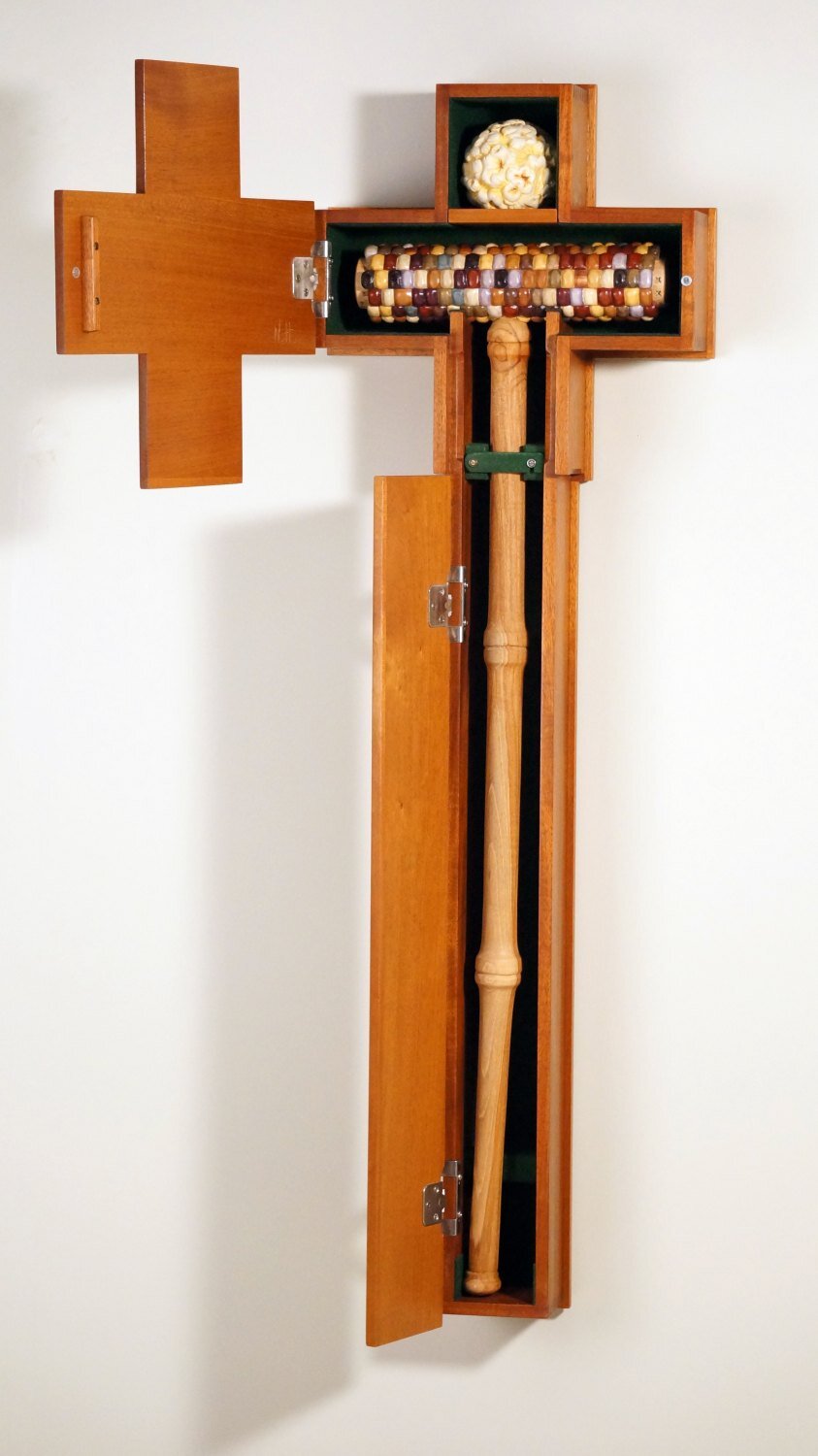I started gardening about the time I started making furniture. I have to credit my boss, antique dealer Frank Boykin, for getting me started. He loaned my wife and I a plot of land in rural Fosters, Alabama to clear and make a garden. When we started, it was mostly a survival strategy, to supplement my income with produce-a strategy I recommend to any artist who has the space and is so inclined.
But, it soon became much more than that. As a young, hippyish guy in Alabama, I found that gardening provided me with a lingua Franca that opened up communications to people with whom I thought I had little in common. Everyone there gardened, and all had stories, tips, and seeds to trade. That communication along with the richness in color, form, and flavor became the basis for a long-standing body of work involving vegetables. It became a universally-understood vocabulary, without the need for a Star Trek translator. And, during the pandemic, the garden became a refuge.
In early March of 2020, I received an invitation from the Messler Gallery-part of the Center for Furniture Craftsmanship to make a piece for a croquet-themed exhibition slated for June-October of that year. The exhibition was curated by furniture maker Silas Kopf and curator Jennifer-Navva Milliken, both of whom I highly respect. When I accepted the invitation, the news of the pandemic was only beginning to sink in.
Corn is impractical to grow in a small garden-it requires space and much other corn to pollinate well. Each silk represents a kernel, and if it does not get a pollen grain, there is a skip in the ear-and the labor of hand pollinating was just not worth the return until I heard about Glass Gem Corn-flint corn that has been selected for an astonishing array of colors. I was just about to plant my second bed from seed I had saved from 2019 when I got the invitation. Long story short, I decided to focus on this corn, and my piece for the show and my “crop” developed together.
Glass Gem Corn from my garden and carved croquet mallet.
For the kernels, I dug through my wood stacks to locate woods of similar colors-walnut, wenge, pau amarello, satinwood, mahogany, bloodwood, shitimwood, holly, purpleheart and more. I cut them into pieces for 1-3 kernels and glued them to pieces of maple-I won’t go into the details here. The photoa above shows how the kernels were carved, row-by-row.
The croquet ball is a maple popcorn ball, like people used to give kids on Halloween, before anyone thought of putting razor blades in them. We made a batch and ate all but the model. I had forgotten how good they were-and easy to make. I mixed various shades of shellac to get the caramel coloring between the kernels.
VENUES:
Messler Gallery
Center for Furniture Craftsmanship
Rockport, ME
September 2020-January 2021
__________________________
Center for Art in Wood
Philadelphia, PA
August 6 - October 23, 2021
__________________________
Fuller Craft Museum
Brockton, MA
June 4-October 23, 2022
Carving is a contemplative process-part contemplating the next cut or the sharpness of the tool, or as yet unresolved aspects of the piece. It seemed as though the relative isolation of the pandemic made it more so. Such an elaborate instrument demanded a fitted case or cabinet. Like a violin case, the instrument dictates the shape.
Other than being the obvious cruciform, the shape of the cabinet reminded me of an iconic sign on the edge of the little cornfield town in Iowa where I was born. As a kid I was always fascinated by the neon flashing EAT-GAS. That was well before massive quantities of corn were fermented into ethanol as a gasoline additive. That sign now seems prophetic.
Cornfield Croquet -by Craig Nutt
If I were a poet
I would write a song
About a time of innocence
When oranges came in wooden crates
Whose slats and straightened nails
became forts, and racers.
When things of wonder –
microscopes and erector sets,
Came in wooden boxes
with fingers entwined
Like the church, the steeple,
see all the people.
If I were a poet
I would write a song
About summer games
When the quiet breeze
was punctuated by meadowlarks
and the crack of wood.
I would write about pins and bats,
mallets and balls
Nested in their cribs
Striped red and blue,
Green, yellow, and orange.
If I were a poet
I would write a song
About the place
where cornfield meets town
Where a cross beside the road
Buzzes neon orange:
EAT GAS, EAT GAS, EAT GAS.
Iconic, absurd, and prophetic:
EAT GAS, EAT GAS, EAT GAS.
If I were a poet
I would write a song
About a time
Of isolation and fear.
It would sing out against brutality
and injustice.
It would weep for the lost.
It would reach in for strength
and resolve.
It would plead for love
and compassion.
If I were a poet
I would write a song
About dirt under the nails
About the rolling up of sleeves
About planting seeds
and tending sprouts
About digging weeds
About harvest and loss
About beauty and promise.
If I were a poet
I would find a metaphor
In the pollination of corn.
I would sing a song to ears
Bejeweled in splendid hues,
Each seed tied
To its ancestors by a thread
fine as silk.
Each bound to its siblings
by common enterprise.
But my craft is one
of wood and glue.
I perform my work with
chisel and saw,
Rehearsing my marks
in wakeful sleep,
For my pencil
has no eraser.
If I were a poet
I would write a song
With words that
inspire and enlighten.
But I will do well
to amuse and bewilder.
-September, 2020






